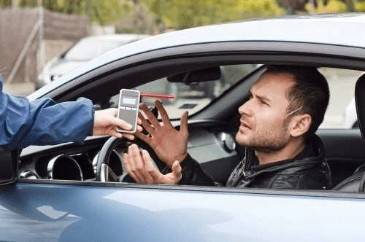Have you been charged with a DUI? Check out our article about DUI traffic stop FAQs and learn all about drunk driving. Then call our attorneys.
Although we all know that driving while intoxicated or under the influence of illicit drugs is dangerous, the unfortunate reality is that it’s quite common. Each and every day, people choose to drink and drive nearly 300,000 times. But shockingly, fewer than 4,000 are arrested for this crime. While it may seem like you can beat the odds, you should never get behind the wheel if you’ve been drinking or drugging. However, if you are ever pulled over on suspicion of a DUI, you may want to keep these FAQs in mind.
 How do police detect that a motorist is driving while under the influence of drugs or alcohol?Police use a few different methods to determine whether a driver might be operating a vehicle under the influence. If they observe a motorist driving erratically (i.e., speeding, swerving, driving too slowly, failing to stop or yield, or other strange behaviors), they may decide to pull over the driver to check out the situation. At that point, they’ll look for other indicators that a driver may be intoxicated, like blurry eyes, slow movements, slurred speech, or the odor of alcohol.If what a police officer observes makes them believe a driver might be intoxicated, they will have the driver perform field sobriety tests. These tests often include speech tests or physical tests (like walking in a straight line or standing on one leg). Should a driver fail these tests, they may be subjected to a chemical test. Before a driver is arrested, they may be asked to take a breathalyzer test; they may also be asked to take a urine or blood test later on at the police station.
How do police detect that a motorist is driving while under the influence of drugs or alcohol?Police use a few different methods to determine whether a driver might be operating a vehicle under the influence. If they observe a motorist driving erratically (i.e., speeding, swerving, driving too slowly, failing to stop or yield, or other strange behaviors), they may decide to pull over the driver to check out the situation. At that point, they’ll look for other indicators that a driver may be intoxicated, like blurry eyes, slow movements, slurred speech, or the odor of alcohol.If what a police officer observes makes them believe a driver might be intoxicated, they will have the driver perform field sobriety tests. These tests often include speech tests or physical tests (like walking in a straight line or standing on one leg). Should a driver fail these tests, they may be subjected to a chemical test. Before a driver is arrested, they may be asked to take a breathalyzer test; they may also be asked to take a urine or blood test later on at the police station.
Am I forced to take these tests if I’m pulled over?Every state has their own laws in terms of implied consent for DUI tests. If you are arrested for a DUI in Oklahoma, the law requires you to submit to any breath, blood, urine, and/or saliva tests. If you refuse to take these chemical tests, you will automatically lose your driver’s license for at least six months and will be forced to install an ignition interlock device on your car for 18 months. In most cases, refusing to take these tests upon being arrested isn’t the best idea. Of course, a DUI conviction will carry a heftier sentence, but your refusal to take the tests probably won’t help your case. You’d be better off finding a DUI lawyer as soon as you’re arrested to ensure your rights are protected throughout this process.
Is a police officer allowed to ask me questions without reading me my rights?Your DUI attorney will tell you that if you are actually in custody, a police officer must give your Miranda warnings before questioning you. In other words, a handcuffed driver must be read his rights before being questioned, but an officer doesn’t have to read you these warnings before asking you questions if you’ve simply been pulled over. That said, you are well within your rights to avoid self-incrimination. While you should never be disrespectful towards a police officer, you can politely decline to answer any questions they ask to protect your own rights.
If I’m arrested, do I need a DUI lawyer?In a word, yes. Should you be arrested for driving while intoxicated, your first step should be to contact a reputable DUI attorney. Each case has different circumstances and challenges, but every one needs to be taken seriously. A DUI conviction can have major consequences for your future. While your DUI attorney can’t promise your case will be dismissed or you’ll be found not guilty, they’ll fight for the best possible outcome and will ensure your rights are not violated.If you are facing a DUI charge, it’s important to have an experienced DUI attorney by your side. To find out more or to schedule a consultation, contact Mayor Law today.
